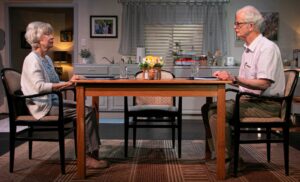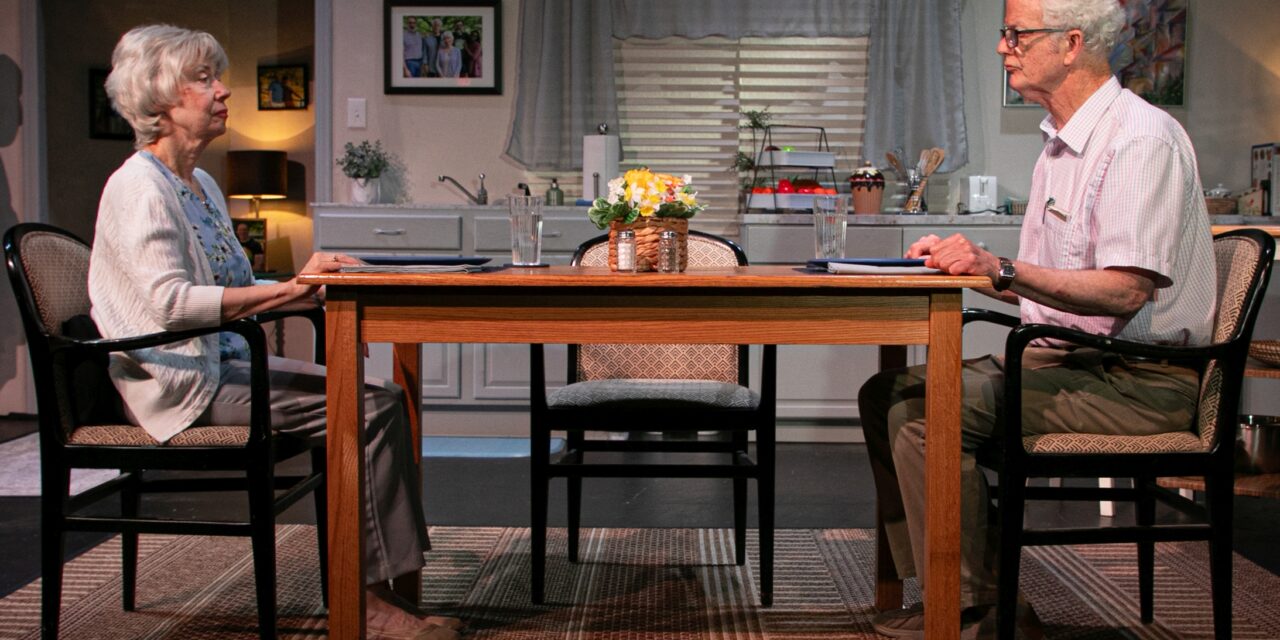
Faceoff at dinner: Lenore Field and Paul Newell in Honest Pint’s GRAND HORIZONS. Photo credit: Jennifer Sanderson
RALEIGH, NC – The joke comes from the annals of second-wave feminism, but there’s a truth still embedded in its barb:
What’s the difference between a man and a U.S. Savings Bond?
Eventually, the bond matures.
For many, that process is hardly linear – or irreversible, as it turns out. Driving back once from a Christmas trip home, my partner asked me what time it was. After I told her, she said, “No. What decade?”
Apparently I’d gotten firmly in touch with – or devolved into – some earlier version of a manchild at my parents’ place. My good one was merely curious about when the rest of me might be returning.
I think we can stipulate that no gender or sexual orientation has a monopoly on regression at home for the holidays. Not when parents, sibs, and extended family have so many subtle and thoroughly disempowering ways of letting us know just how much we’ll always be their little angel, princess, Finster, or changeling.
But even in the absence of such power plays, a crisis on the home front can trigger and call forth, for lack of a better term, the earlier members of our own original cast.
That’s certainly the case at the start of Honest Pint Theatre’s rewarding production of Grand Horizons, now playing at Theatre Raleigh’s studio space, one block away from the company’s main digs on Barrow Drive.
In playwright Bess Wohl’s insightful dramatic family comedy, which made the short list for the 2020 Tony Awards, unhappy matriarch Nancy French (Lenore Field) has abruptly decided to pull the plug on her 50-year marriage.
Her taciturn, stick-in-the-mud husband, Bill (Paul Newell), is okay with the move.
The kids? Not so much, to say the very least.
In a jaw-dropping second scene, Nancy’s announcement provokes an all-hands-on-deck family meeting where the boys, Brian (Kevin Varner) and Ben (Brook North) – now two middle-aged men; the first queer, the second het with a pregnant wife (Lormarev Jones) in tow – vie for the distinction of throwing the bigger temper tantrum over mom’s somewhat late initiative toward autonomy. In the act of supposedly listening to her, all three fill up so much airspace that she can’t get a word in edgewise.

Heartbreak or psoriasis? Lenore Field, Paul Newell, Lormarev Jones and Brook North, in Honest Pint’s GRAND HORIZONS. Photo credit: Jennifer Sanderson
When Brian asks if Nancy actually wants a divorce, Ben immediately asserts, “She doesn’t know what she wants” – not that either has given her the first chance to weigh in on the issue for herself. The verbal barricade continues through a panicky, absurd etiological search – how’s the water intake? Could wanting a divorce be an early sign of Alzheimer’s? – before Jess, Ben’s wife (a therapist, in a far too convenient plot device), clumsily attempts a ham-handed intake interview for couple’s therapy. When she soothingly tells Nancy, “The next exercise would be for you to try telling Bill what you want,” Nancy resolutely responds, “I want a divorce,” and Bill gets up to continue packing.
As Brian and Ben increasingly signal the veto power they think they have over the situation, it becomes more and more evident: Rarely have two characters on stage demanded more control over everyone else’s emotions while demonstrating a complete inability to control their own.
“It’s a fifty-year marriage,” Ben whines at one point. “You can’t end it without a conversation. I’m not even sure you can end it at all at this point…I mean, you’re almost 80. Like, how much else — even is there?”
After that tribute to diplomacy and tact, Tommy (an exuberant Thomas Porter), a naughty-boy pick-up from a local bar, reasonably tells Brian that his parents can do whatever they want. That’s when Brian explodes: “Adults cannot do what they want. The defining feature of adulthood is that you never get to do what you want. Children do what they want. Adults struggle to meet the needs of other people, make a living, satisfy a thousand obligations, still fall short, and wind up disappointing everyone.”
In relatively short order, Nancy and Bill’s relationship isn’t the only one to wind up on the couch. Ben’s complaints about his parents raise questions in Jess’ mind about the kind of marriage he’s capable of, while Brian concludes that his failing lifelong search for intimacy stems from never having actually seen it between his own parents.
On Joel Soren’s set, a damningly nondescript depiction of “senior living” architecture, director Susannah Hough has unerringly plumbed the psychological dynamics of a family where everything’s been okay for far too long – but only because the mother never felt comfortable showing up in the first place. Field, who’s long been an underutilized talent despite her obvious status as one of the region’s strongest actors, has found a vehicle worthy of her work here as Nancy, a septuagenarian woman attempting, for the first time, to come into her own.
Playwrights are usually content to use the sexual lives of parents for an uncomfortable laugh before swiftly shoving the subject off stage. Wohl, however, treats Nancy’s disclosure of erotic fulfillment to her adult child – and the truth that reveals about the rest of her decidedly arid marriage – as a mandatory part of showing up in her fullness. When Brian tries to pull away from it, Nancy insists: “You have to hear this. I will be a whole person to you. I will.”
It’s unsurprising that Hough has developed so strong an ensemble among this cast of veterans. Paul Newell began his career-best performance of Bill as a brusque old crab before the first faint notes of vulnerability entered later on. Jones was sharp, of course, as a Jess who has to navigate another family’s psychodynamics while figuring out its implications for her own. Dorothy Recasner Brown makes a rare and welcome appearance as a troublesome neighbor, Carla.
Varner and North brought what is for both a trademark of believability as brothers still struggling to leave their first home and childhood behind. Self-centered as they are, the ground beneath both still trembles when these revelations force them both to reassess all they think they’ve known of family. How much of their childhood was built on a lie? Who are the ones who raised them? What relationships, if any, are possible now, because of all that happened – and never happened?
Big questions all, from a not-so-unassuming little family comedy that takes its characters and us through some turns before pointing toward a way out of the labyrinth.
Grand Horizons continues through Saturday, June 1. See our calendar for details.













